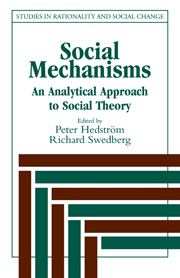Book contents
- Frontmatter
- Contents
- ACKNOWLEDGMENTS
- LIST OF CONTRIBUTORS
- 1 Social mechanisms: An introductory essay
- 2 Social mechanisms and social dynamics
- 3 A plea for mechanisms
- 4 Real virtuality
- 5 Concatenations of mechanisms
- 6 Do economists use social mechanisms to explain?
- 7 Social mechanisms of dissonance reduction
- 8 Social mechanisms without black boxes
- 9 Is sociological theory too grand for social mechanisms?
- 10 Theoretical mechanisms and the empirical study of social processes
- 11 Monopolistic competition as a mechanism: Corporations, universities, and nation-states in competitive fields
- 12 Rational imitation
- AUTHOR INDEX
- SUBJECT INDEX
10 - Theoretical mechanisms and the empirical study of social processes
Published online by Cambridge University Press: 24 March 2010
- Frontmatter
- Contents
- ACKNOWLEDGMENTS
- LIST OF CONTRIBUTORS
- 1 Social mechanisms: An introductory essay
- 2 Social mechanisms and social dynamics
- 3 A plea for mechanisms
- 4 Real virtuality
- 5 Concatenations of mechanisms
- 6 Do economists use social mechanisms to explain?
- 7 Social mechanisms of dissonance reduction
- 8 Social mechanisms without black boxes
- 9 Is sociological theory too grand for social mechanisms?
- 10 Theoretical mechanisms and the empirical study of social processes
- 11 Monopolistic competition as a mechanism: Corporations, universities, and nation-states in competitive fields
- 12 Rational imitation
- AUTHOR INDEX
- SUBJECT INDEX
Summary
Introduction
This chapter is about the integration of theory and research. Like other reasonable sociologists, I believe the integration of theory and evidence is important and that sociology will never move up from its humble position in the hierarchy of science unless we achieve a better integration between reliable knowledge and powerful theory. Further, since I am a quantitative sociologist, I believe that although qualitative approaches are important for the development of powerful theory, knowledge produced by qualitative research will never be sufficiently reliable and generalizable to satisfy the requirements for a complete scientific theory.
Contrary to many of my peers, I also believe that most current practices in quantitative data analysis in sociology do a very poor job of integrating theory and research. There has been enormous progress in what we can do with data, and in the sophistication of mathematical and statistical tools for the analysis of data, over the last three or four decades. Nevertheless, quantitative sociology remains very theory-poor. In fact, the mainstream has regressed rather than progressed. Quantitative sociology is now less theoretically informed and less relevant for theoretical progress than it was three decades ago.
The reason quantitative sociology has become theoretically poor is that the enormous progress in methodological power has turned quantitative methodology into a branch of statistics This has led to a fascination, if not an obsession, with statistical models and concerns, and a neglect of the need to develop sociological models mirroring conceptions of mechanisms of social processes.
- Type
- Chapter
- Information
- Social MechanismsAn Analytical Approach to Social Theory, pp. 238 - 266Publisher: Cambridge University PressPrint publication year: 1998
- 65
- Cited by

